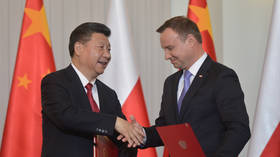Why upsetting China to keep Washington happy is a bad idea

One of the more interesting aspects of 2021 was how some countries in Eastern Europe readily turned against China and weaponized anti-communism for their own political gain. Lithuania was a good case in point.
The conflict against Vilnius was writ large with Lithuania’s abrupt departure from China’s 17+1 European bloc and the subsequent opening of a ‘Taiwanese representative office’ – a move the country’s president, Gitanas Nauseda, has since expressed doubts about. Beijing retaliated by downgrading relations and imposing a trade embargo on the Baltic state.
But if you are assuming the door has been shut on Beijing by the wider region despite the geopolitical friction, you might want to reconsider. Out of seemingly nowhere on Wednesday, Polish President Andrzej Duda announced he would be attending the Beijing Winter Olympics, ending hopes for a European Union-wide diplomatic boycott, and declared to the media that “it’s no longer in Poland’s interests to continue criticizing China simply to please the Americans.”
In addition, on a quieter note, China’s foreign minister, Wang Yi, held a video conference with his counterpart in Estonia, vowing to strengthen economic cooperation. Beijing will herald both events as a slap in the face to Lithuania, which has demanded the entire EU show solidarity with it.
Irrespective of that, Duda’s decision will come as a shock to some. When the Trump administration was in place in the US, he was an advocate of some of its anti-China initiatives, with Poland one of the first countries to vow not to use Huawei, and even overseeing the prosecution of one its employees for suspected espionage.
It has traditionally been one of the most ardently pro-US states in Europe, similar to Lithuania, especially in light of recent disputes with Russia and Belarus. But the geopolitical context has been changing for a while. First of all, Poland is engaged in a heated conflict with the EU over a number of issues, including its judiciary, media, migration, LGBTQ rights, and abortion.
These confrontations, which have resulted in EU penalties and legal action, have increased Euroscepticism. Poland is being defined by hard-line conservatism and populism, but while, in theory, this ought to produce anti-China politics – as it does in English-speaking countries – instead, the conflict with the EU and Warsaw’s alienation within the bloc has led Duda to turn to Beijing as a source of external support and leverage. It represents a partner that will respect its national sovereignty and not attack it on the premise of ‘human rights’.
The same pattern has also been playing out in Hungary with Prime Minister Viktor Orban, who is also pro-China, albeit to a considerably greater extent. Poland and Hungary together have arguably been the biggest disruptors in the EU.
But this still doesn’t fully explain why Duda has flipped from an anti-China stance towards courting Beijing again. The truth is that this is also being caused by a shift in Washington, and not just Brussels. While the Trump administration was in power, the White House did not disguise its contempt for the EU and was prepared to deal with Poland on a bilateral level – as was seen by the latter’s hosting of 1,000 American troops – regardless of what the rest of the bloc wanted. It was also prepared to overlook its highly conservative policies. Why, after all, would Republicans oppose ultra-conservative social policy?
However, a Biden administration that places a greater emphasis on human rights, liberalism, and multilateralism sees Poland’s government as much less appealing to deal with for a number of reasons, and the ‘special relationship’ of the Trump era has faded. This leaves a geopolitical vacuum, which Warsaw is now filling by tilting back to Beijing.
Not long after Trump left office, Duda phoned Xi Jinping. Later in 2021, the Polish foreign minister visited China on invitation. Now, Duda has become the first EU leader to say he will attend the Winter Olympics and has positioned it as a deliberate snub to Washington, undercutting the solidarity of its boycott.
By extension, it has also exposed how Lithuania has alienated itself within the EU and adds to a growing body of evidence that even its closest neighbours are unsympathetic over the self-imposed damage it has done to its relations with China.
From Beijing’s point of view, the support from Duda is a huge diplomatic win. It’s a spanner in the works for America’s attempts to turn Europe against China, reminding us that there is no united front here, and it embarrasses Vilnius – but most specifically it shows there is still life in Beijing’s relationship with the bloc’s centre and east.
The region might contain China’s biggest opponents in Europe, but it also has some of its greatest supporters too.
It is also worth noting that with China’s GDP per capita crossing the $12,500 mark at the end of 2021, moving towards the World Bank’s ‘high income’ bracket of nations, it has started to catch up with and even overtake some of Europe’s poorer states.
Poland’s GDP per capita, for example, was only $15,656 at the end of 2020. And China is already far ahead of some of the Balkan states, especially those not in the EU. This amply demonstrates how far it has come, and begs the question why it is in the interest of countries to pursue confrontation against Beijing at America’s behest?
Of course, there may be individual agitators such as Lithuania. But ultimately, it is clear that despite the historically entrenched anti-communism which is at play, a full-on cold war is unlikely due to China’s economic incentives. Furthermore, the apparent ideological conflict with Beijing can paradoxically be of some benefit for right-wing states who don’t want to conform with the liberal values of the West.
Given all that, it would be unwise to rule out China in this region yet.
The statements, views and opinions expressed in this column are solely those of the author and do not necessarily represent those of RT.
















